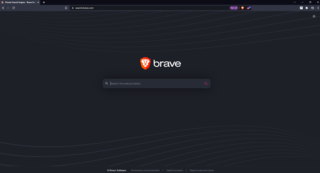Microsoft Developer Network (MSDN) was the division of Microsoft responsible for managing the firm's relationship with developers and testers, such as hardware developers interested in the operating system (OS), and software developers developing on the various OS platforms or using the API or scripting languages of Microsoft's applications. The relationship management was situated in assorted media: web sites, newsletters, developer conferences, trade media, blogs and DVD distribution.

iCab is a web browser for MacOS and Classic Mac OS by Alexander Clauss, derived from Crystal Atari Browser (CAB) for Atari TOS compatible computers. It was one of the few browsers still updated for the classic Mac OS prior to that version being discontinued after version 3.0.5 in 2008; Classilla was the last browser that was maintained for that OS but it was discontinued in 2021.

Maxthon is a freeware web browser, created by JeffChen in Singapore. It is available for Windows, macOS, Linux, and as Maxthon Mobile for Android, iOS, and Windows Phone 8. Since version 6, Maxthon is based on Chromium.
This is a comparison of both historical and current web browsers based on developer, engine, platform(s), releases, license, and cost.
Evernote is a note-taking and task-management application developed by the Evernote Corporation. It is intended for archiving and creating notes with embedded photos, audio, and saved web content. Notes are stored in virtual "notebooks" and can be tagged, annotated, edited, searched, and exported.

Adobe Lightroom is an image organization and image processing software developed by Adobe as part of the Creative Cloud subscription family. It is supported on Windows, macOS, iOS, Android, and tvOS. Its primary uses include importing, saving, viewing, organizing, tagging, editing, and sharing large numbers of digital images. Lightroom's editing functions include white balance, presence, tone, tone curve, HSL, color grading, detail, lens corrections, and calibration manipulation, as well as transformation, spot removal, red eye correction, graduated filters, radial filters, and adjustment brushing. The name of the software is based on darkrooms used for processing light-sensitive photographic materials.
Picasa Web Albums (PWA) was an image hosting and sharing web service from Google, often compared to Flickr and similar sites. The service links with Google's photo organizing desktop program Picasa. It was discontinued in May 2016 and succeeded by Google Photos which does not support sharing photo albums on the public world wide web.

Opera is a multi-platform web browser developed by its namesake company Opera. The current edition of the browser is based on Chromium. Opera is available on Windows, macOS, Linux, Android, and iOS. There are also mobile versions called Opera Mobile and Opera Mini. Opera users also have access to Opera News, a news app based on an AI platform.

Google Chrome is a web browser developed by Google. It was first released in 2008 for Microsoft Windows, built with free software components from Apple WebKit and Mozilla Firefox. Versions were later released for Linux, macOS, iOS, and also for Android, where it is the default browser. The browser is also the main component of ChromeOS, where it serves as the platform for web applications.

DuckDuckGo is an American software company that offers a number of products intended to help people protect their online privacy. The flagship product is a search engine that has been praised by privacy advocates. Subsequent products include extensions for all major web browsers and a custom DuckDuckGo web browser.
Google Drive is a file storage and synchronization service developed by Google. Launched on April 24, 2012, Google Drive allows users to store files in the cloud, synchronize files across devices, and share files. In addition to a web interface, Google Drive offers apps with offline capabilities for Windows and macOS computers, and Android and iOS smartphones and tablets. Google Drive encompasses Google Docs, Google Sheets, and Google Slides, which are a part of the Google Docs Editors office suite that permits collaborative editing of documents, spreadsheets, presentations, drawings, forms, and more. Files created and edited through the Google Docs suite are saved in Google Drive.

Gyazo is an open-source and free screenshot program for Windows, macOS, and Linux. The program allows users to create screenshots and upload them to the web, producing a unique URL to the screenshot. The program's name "Gyazo" is a pun on the Japanese word for "image".
Ecosia is a search engine based in Berlin, Germany. Ecosia considers itself a social business, claiming to be CO2-negative, supporting full financial transparency, and protecting the privacy of its users.

Brave is a free and open-source web browser developed by Brave Software, Inc. based on the Chromium web browser. Brave is a privacy-focused browser, which automatically blocks most advertisements and website trackers in its default settings. Users can turn on optional ads that reward them for their attention in the form of Basic Attention Tokens (BAT), which can be used as a cryptocurrency or to make payments to registered websites and content creators.

Mojeek is a search engine based in the United Kingdom. The search results provided by Mojeek come from its own index of web pages, created by crawling the web.
Google One is a subscription service developed by Google that offers expanded cloud storage and is intended for the consumer market. Google One paid plans offer cloud storage starting at 100 gigabytes, up to a maximum of 30 terabytes, an expansion from the free Google Account storage space of 15 GB, which is shared across Google Drive, Gmail, and Google Photos.

CM Browser is a web browser developed by Cheetah Mobile. The browser is based on Chromium and supports both the WebKit and Trident browser engines. Jinshan Network claims that CM Browser is the first secure dual-engine browser with a "browser intrusion prevention system".

Brave Search is a search engine developed by Brave Software, Inc., which is set as the default search engine for Brave web browser users in certain countries.







